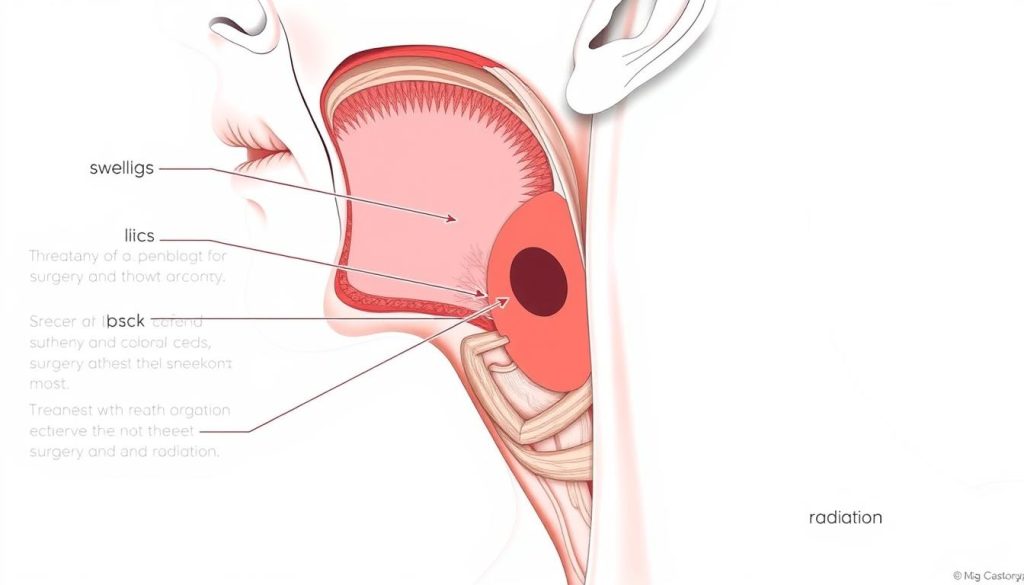Throat cancer is a serious condition that affects thousands of Americans each year. It can develop in different parts of the throat, including the larynx, leading to laryngeal carcinoma. Knowing the signs and symptoms is key for early detection and better outcomes.
In this guide, we’ll look at the different types of throat cancer, common symptoms, risk factors, and treatment options. We’ll cover everything from early signs to advanced surgical techniques. Our goal is to provide a clear picture of this complex disease.
We’ll mix medical knowledge with real-life stories to help patients and families dealing with throat cancer. By the end of this article, you’ll understand throat cancer better. You’ll also feel more ready to talk about your concerns with your healthcare provider. Let’s explore the world of throat cancer together, armed with knowledge and hope.
Understanding Throat Cancer and Its Types
Throat cancer is a complex disease that affects the head and neck area. It can develop in different parts of the throat, leading to various types of cancer. Each type has its own characteristics and treatment options.
Squamous Cell Carcinoma
Squamous cell carcinoma is the most common type of throat cancer. It starts in the flat cells lining the throat and makes up about 90% of cases. This type often affects the larynx, causing laryngeal carcinoma. Early detection is key for successful treatment.
Adenocarcinoma
Adenocarcinoma is less common but can occur in the throat. It begins in glandular cells that produce mucus. This type of cancer may develop in the salivary glands or other glandular tissues in the throat area.
Sarcomas and Other Rare Types
Sarcomas in the throat are rare. They start in connective tissues, muscles, or blood vessels. Other uncommon types include lymphomas and melanomas. These rare forms require specialized treatment approaches.
| Cancer Type | Origin | Prevalence |
|---|---|---|
| Squamous Cell Carcinoma | Flat cells lining the throat | 90% |
| Adenocarcinoma | Glandular cells | 5-10% |
| Sarcomas and Others | Connective tissues, muscles | Less than 5% |
Understanding these types helps in accurate diagnosis and tailored treatment plans for head and neck cancer patients. Early recognition of symptoms and prompt medical attention are key to improving outcomes.
Early Warning Signs of Throat Cancer
Spotting throat cancer symptoms early can save lives. Don’t overlook small changes in your throat or voice. Look out for symptoms that don’t go away after two weeks.
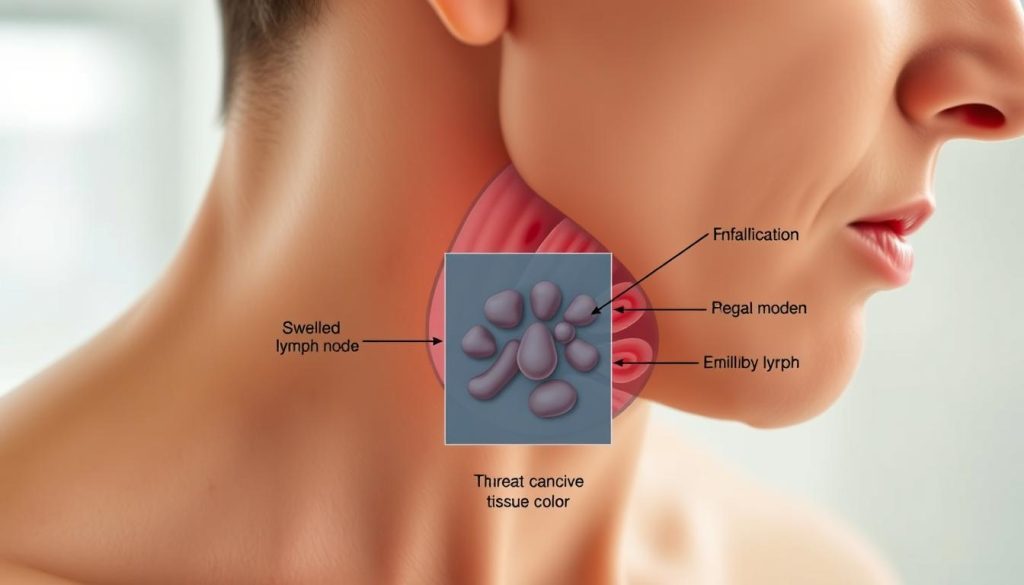
Hoarseness or a change in voice is a common sign. If your voice sounds raspy or strained for a long time, see a doctor. Trouble swallowing, or dysphagia, is another warning sign. You might feel like food is stuck or swallowing hurts.
Other throat cancer symptoms include:
- Persistent sore throat
- Unexplained weight loss
- Ear pain
- Lump in the neck or throat
Don’t ignore these signs as minor. Early detection means better treatment. If you have these symptoms, see your doctor right away. Your body is trying to tell you something – listen.
Common Symptoms That Shouldn’t Be Ignored
Spotting throat cancer symptoms early is key to better treatment. Let’s look at important signs that need medical help.
Voice Changes and Hoarseness
Hoarseness that lasts over two weeks might mean throat cancer. Tumors on the vocal cords cause this change. If your voice sounds raspy or strained, it’s not just a cold.
Swallowing Difficulties
Having trouble swallowing, or dysphagia, is a warning sign. You might feel like food is stuck or eating hurts. These signs could mean a tumor is blocking your throat.
Persistent Sore Throat
A sore throat that lasts weeks might not be just a cold. If it hurts your ear or makes it hard to open your mouth, see a healthcare provider.
Unexplained Weight Loss
Unexpected weight loss could be a cancer sign, including throat cancer. It often happens because eating is hard due to pain or swallowing problems.
| Symptom | Description | Action |
|---|---|---|
| Hoarseness | Raspy or strained voice for over 2 weeks | See a doctor |
| Dysphagia | Difficulty or pain when swallowing | Seek medical evaluation |
| Sore Throat | Persistent pain lasting several weeks | Get throat examination |
| Weight Loss | Unexplained loss of 5% or more body weight | Consult healthcare provider |
Risk Factors Contributing to Throat Cancer
Throat cancer can affect anyone, but some factors can raise your risk. Knowing these risks helps you take care of your health.
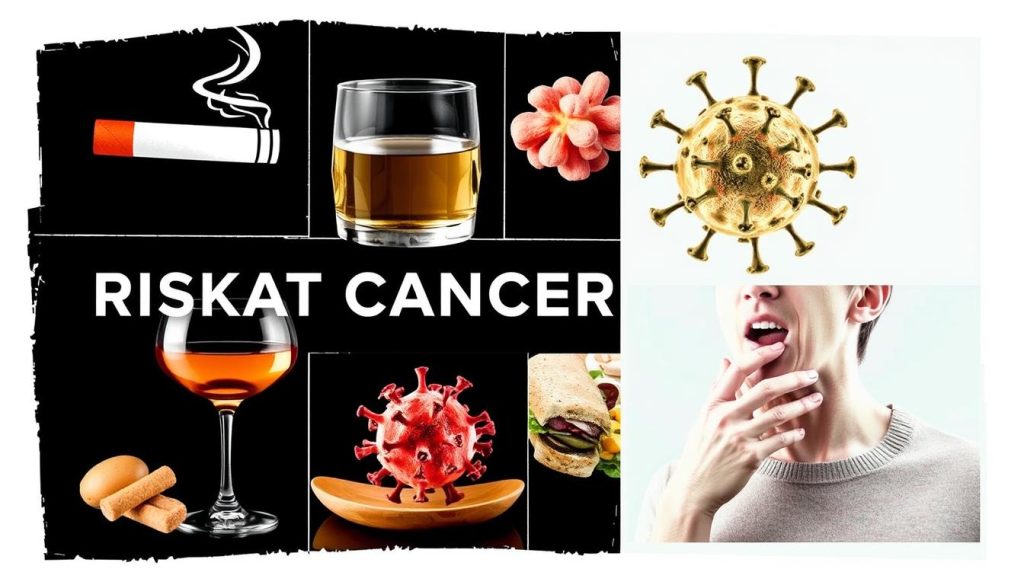
Smoking is a big risk for throat cancer. Tobacco smoke harms cells in your throat, which can lead to cancer. The more you smoke, the greater your risk.
Drinking too much alcohol is also a risk. It can irritate and inflame your throat tissues. Smoking and drinking together increases your risk even more.
Other risk factors include:
- Poor diet lacking fruits and vegetables
- Exposure to certain chemicals or substances
- Family history of throat cancer
- Weakened immune system
While some risks are out of our control, many are lifestyle choices. Making healthier choices can lower your risk of throat cancer.
| Risk Factor | Level of Risk | Controllable? |
|---|---|---|
| Smoking | Very High | Yes |
| Alcohol Consumption | High | Yes |
| Poor Diet | Moderate | Yes |
| Chemical Exposure | Moderate | Sometimes |
| Family History | Moderate | No |
Having one or more risk factors doesn’t mean you’ll get throat cancer. Regular check-ups and a healthy lifestyle can help prevent it.
The Role of HPV in Throat Cancer Development
Human papillomavirus (HPV) is a big player in throat cancer. It’s known for causing cervical cancer and is now linked to more throat cancer cases. Knowing how HPV affects us is key to stopping it early.
HPV Transmission and Prevention
HPV spreads through skin-to-skin contact, often during sex. To lower your risk of throat cancer from HPV:
- Practice safe sex
- Limit sexual partners
- Avoid tobacco use
- Maintain good oral hygiene
Vaccination Recommendations
HPV vaccination is a strong way to prevent throat cancer. The CDC suggests:
| Age Group | Recommendation |
|---|---|
| 11-12 years | Start vaccination series |
| 13-26 years | Catch-up vaccination |
| 27-45 years | Discuss with healthcare provider |
Regular Screening Importance
There’s no specific test for throat cancer, but regular dental visits can spot early signs. Talk to your doctor if you have ongoing symptoms. Catching HPV-related throat cancer early can lead to better treatment and survival.
By understanding the HPV and throat cancer link, we can take steps to prevent it. Regular health checks and preventive measures help lower the risk of this disease.
Diagnostic Procedures and Tests
Getting a correct diagnosis is key for treating throat cancer. Doctors use different methods to find laryngeal carcinoma and other throat cancers. Let’s look at the main diagnostic steps patients might go through.
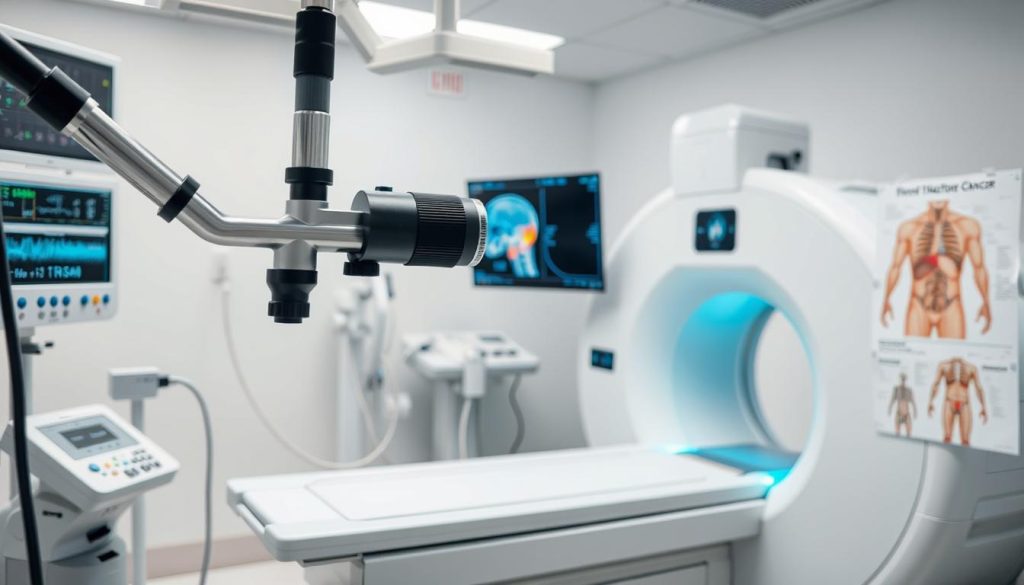
A doctor’s first step is a physical exam. They check the throat and neck for lumps or swelling. They might use a small mirror or a thin, flexible tube with a camera to see hard-to-see spots.
Imaging tests are also important for diagnosing throat cancer. These include:
- CT scans: Detailed cross-sectional images of the throat
- MRI: High-resolution images using magnetic fields
- PET scans: Detect cancer cells’ metabolic activity
A biopsy is key for confirming throat cancer. A small tissue sample is taken and looked at under a microscope. This helps figure out the cancer type and stage.
| Diagnostic Test | Purpose | Patient Experience |
|---|---|---|
| Laryngoscopy | Examine voice box | Mild discomfort, throat numbing |
| Endoscopy | Inspect throat and esophagus | Sedation, minimal pain |
| Fine-needle aspiration | Sample suspicious lymph nodes | Quick, local anesthesia |
These tests help doctors get the info they need about throat cancer. Knowing what to expect can help patients feel less anxious and prepare for their diagnostic journey.
Staging and Grading of Throat Cancer
Knowing the stages of throat cancer is vital for treatment and outlook. Doctors use the TNM classification to figure out how far the disease has spread. This helps tailor a treatment plan for each patient.
TNM Classification System
The TNM system looks at the tumor, nodes, and metastasis. It checks the tumor size, if lymph nodes are involved, and if cancer has spread. This detailed look is key to staging throat cancer.
Different Cancer Stages Explained
Throat cancer stages range from 0 to IV. Stage 0 means abnormal cells that haven’t invaded nearby tissue. Stages I and II have small tumors in the throat. Stage III shows bigger tumors or lymph node spread. Stage IV means cancer has spread to distant organs.
Survival Rates by Stage
Survival rates change with the stage at diagnosis. Early-stage cancers usually have better outcomes. Five-year survival rates can be over 90% for stage I and around 30% for stage IV. Remember, these are general stats, and individual results can vary.
| Stage | 5-Year Survival Rate |
|---|---|
| I | 90-95% |
| II | 70-80% |
| III | 50-60% |
| IV | 30-40% |
Early detection and treatment are critical for better survival rates. Regular check-ups and quick action on symptoms can greatly improve outcomes for throat cancer.
Traditional Treatment Approaches
Throat cancer treatment has changed a lot over time. Now, patients have many options to fight this tough disease. Doctors usually suggest a mix of traditional methods for laryngeal carcinoma and other head and neck cancers.

Surgery is a key part of treating throat cancer. Surgeons might take out tumors and affected areas. Sometimes, they have to remove parts of the voice box or throat. This helps get rid of cancer cells while keeping healthy tissue.
Radiation therapy is also very important. It uses high-energy beams to kill cancer cells. Doctors might use it alone for early-stage cancers or with other treatments for more serious cases.
Chemotherapy is another big part of treatment plans. It uses strong drugs to kill cancer cells all over the body. Chemotherapy can be used before surgery to make tumors smaller, after surgery to get rid of any left-over cancer, or with radiation therapy.
| Treatment | Primary Use | Common Side Effects |
|---|---|---|
| Surgery | Tumor removal | Voice changes, swallowing difficulties |
| Radiation Therapy | Localized cancer cell destruction | Dry mouth, skin irritation |
| Chemotherapy | Systemic cancer cell elimination | Nausea, fatigue, hair loss |
These traditional methods are the base of throat cancer treatment. Your medical team will make a plan just for you. They’ll consider your diagnosis, cancer stage, and health to help you recover the best way possible.
Advanced Surgical Options and Techniques
Throat cancer surgery has made big strides. New methods lead to better results and faster healing. Let’s dive into these modern approaches.
Minimally Invasive Surgery
Minimally invasive surgery for throat cancer uses small cuts. This method cuts down on pain and speeds up recovery. Surgeons use special tools to remove tumors with great care.
Robotic Surgery Benefits
Robotic surgery is a big leap in throat cancer treatment. It offers:
- Enhanced 3D vision for surgeons
- Steadier hand movements
- Access to hard-to-reach areas
- Less damage to healthy tissue
These benefits mean better results and quicker recovery times.
Post-Surgical Recovery
Recovery from throat cancer surgery varies. Most patients stay in the hospital for a few days. They may need help with eating and talking at first.
Physical and speech therapy are often part of the recovery. With time and support, many patients get back to their normal activities.
| Surgery Type | Hospital Stay | Recovery Time |
|---|---|---|
| Traditional Open Surgery | 7-10 days | 4-6 weeks |
| Minimally Invasive Surgery | 3-5 days | 2-4 weeks |
| Robotic Surgery | 2-4 days | 1-3 weeks |
Radiation Therapy Methods
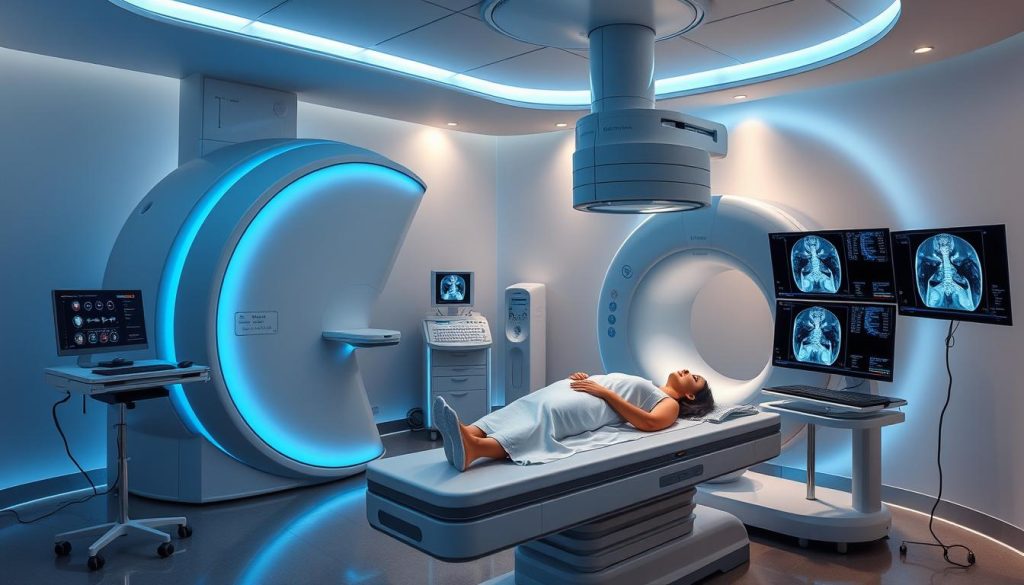
Radiation therapy is a key part of treating throat cancer. It uses high-energy beams to kill cancer cells in the head and neck. This method can be used alone or with other treatments for the best results.
There are two main types of radiation therapy for throat cancer:
- External beam radiation therapy (EBRT)
- Brachytherapy
EBRT is the most common type. It sends radiation from a machine outside the body. Brachytherapy, used less often, places radioactive material close to the tumor.
New technologies in radiation therapy help target cancer cells better. This means less harm to healthy tissue. It helps patients feel better during treatment.
| Radiation Method | How It Works | Benefits | Potential Side Effects |
|---|---|---|---|
| External Beam Radiation | Delivers radiation from outside the body | Precise targeting, shorter treatment times | Skin irritation, dry mouth, fatigue |
| Brachytherapy | Places radioactive material near tumor | Highly targeted, spares healthy tissue | Localized pain, swelling, infection risk |
It’s important to manage side effects during radiation therapy for head and neck cancer. Patients might face dry mouth, trouble swallowing, or skin changes. Your healthcare team will help you deal with these issues and keep you well during treatment.
Chemotherapy Protocols and Side Effects
Chemotherapy is key in treating throat cancer. It uses drugs to kill cancer cells everywhere in the body. Let’s look at what throat cancer patients need to know about chemotherapy.
Common Drug Combinations
Doctors mix different chemotherapy drugs to fight throat cancer. These mixes target cancer cells in various ways. Some common pairs are cisplatin with 5-fluorouracil or docetaxel with cisplatin and 5-fluorouracil.
| Drug Combination | Typical Use |
|---|---|
| Cisplatin + 5-fluorouracil | Early-stage throat cancer |
| Docetaxel + Cisplatin + 5-fluorouracil | Advanced throat cancer |
| Carboplatin + Paclitaxel | Alternative for patients who can’t tolerate cisplatin |
Managing Side Effects
Chemotherapy can lead to side effects like nausea, fatigue, and hair loss. Doctors help patients manage these issues. They might give anti-nausea drugs or suggest diet changes to improve how patients feel.
Treatment Schedule Planning
Chemotherapy schedules depend on the cancer’s stage and the patient’s health. Patients usually get treatment in cycles, with breaks in between. A cycle can last 3-4 weeks, with treatment on specific days. This plan helps fight cancer while managing side effects.
Knowing about chemotherapy can help throat cancer patients prepare. By working with their healthcare team, patients can face this tough but potentially lifesaving treatment.
Integrative and Supportive Care Options
Throat cancer treatment is not just about medicine. It includes using both traditional and natural methods. This way, patients get better care that helps them feel whole again.
Supportive care is key in managing symptoms and side effects. It might include:
- Pain management techniques
- Nutritional counseling
- Physical therapy
- Speech therapy
Integrative therapies can also help. For example:
- Acupuncture for pain and nausea
- Meditation for stress reduction
- Yoga for improved flexibility and relaxation
- Massage therapy for pain and anxiety relief
Psychological support is vital for throat cancer patients. Counseling and support groups help them deal with emotional challenges. Some places even offer art therapy or music therapy as part of their care.
Palliative care aims to improve life quality at any illness stage. It works with treatments to manage symptoms and offer emotional support. Patients often say they feel better and are happier with their care.
By mixing traditional treatments with natural methods, throat cancer patients get a full care package. This package meets their physical, emotional, and spiritual needs.
Recovery and Rehabilitation Process
The journey to recover from throat cancer involves many steps. Patients often struggle with speaking, swallowing, and eating right. Let’s look at the main parts of this journey.
Speech Therapy
Speech therapy is key in throat cancer recovery. Patients might find it hard to speak or change their voice after treatment. A speech therapist helps improve how well they speak, their voice strength, and clarity.
They might do exercises like tongue movements, breathing control, and vocal cord exercises.
Swallowing Rehabilitation
Many patients have trouble swallowing after throat cancer treatment. Swallowing rehab helps them get better at this important skill. Techniques include:
- Exercises to strengthen throat muscles
- Learning new swallowing methods
- Modifying food textures for easier consumption
A speech-language pathologist usually helps with this.
Nutritional Support
Good nutrition is vital for healing and recovery. Many throat cancer patients find it hard to eat because of treatment side effects. Nutritional support might include:
- Customized meal plans
- Liquid or pureed diet options
- Nutritional supplements
- Feeding tube management, if necessary
Dietitians work with patients to make sure they get the nutrients they need.
| Rehabilitation Aspect | Common Challenges | Treatment Approaches |
|---|---|---|
| Speech Therapy | Voice changes, difficulty speaking | Vocal exercises, articulation practice |
| Swallowing Rehabilitation | Dysphagia, choking risk | Muscle strengthening, swallowing techniques |
| Nutritional Support | Weight loss, malnutrition | Modified diets, supplements, feeding tubes |
Prevention Strategies and Lifestyle Changes
Preventing throat cancer is key to staying healthy. Making smart lifestyle choices can greatly lower your risk. Let’s look at some effective ways to prevent throat cancer.
Quitting smoking is the most important step to lower your risk. If you smoke, stopping is essential. You can use nicotine replacement therapy or join support groups to help.
Drinking alcohol in moderation is also vital. The Centers for Disease Control and Prevention suggests no more than one drink a day for women and two for men.
- Eat a balanced diet rich in fruits and vegetables
- Maintain a healthy weight through regular exercise
- Practice safe sex to reduce HPV transmission risk
- Get vaccinated against HPV
- Avoid exposure to harmful chemicals and pollutants
Regular dental check-ups and screenings are important. They can catch oral and throat cancers early. Don’t ignore symptoms like a sore throat or trouble swallowing. Early detection can greatly improve treatment results.
By making these lifestyle changes, you’re taking big steps towards preventing throat cancer. Remember, even small changes can make a big difference in your health and well-being.
Latest Research and Clinical Trials
The world of throat cancer research is moving fast, bringing hope to patients and doctors. Scientists are learning more about laryngeal carcinoma, leading to better treatments. They’re exploring new therapies that aim to lessen side effects and boost results.
Clinical trials are key in improving throat cancer care. These studies test new treatments, like immunotherapy and precision medicine. Patients in trials get early access to new treatments. They also help researchers improve their methods.
For those interested in throat cancer research, staying updated is important. Many medical centers and cancer groups share news on ongoing trials. Patients can talk to their doctors about joining trials, considering the pros and cons. As research advances, the outlook for throat cancer treatment is looking up, with hopes for better survival rates and quality of life.
FAQ
Q: What are the main types of throat cancer?
A: Throat cancer types include squamous cell carcinoma, adenocarcinoma, and sarcomas. Squamous cell carcinoma starts in flat cells. Adenocarcinoma begins in glandular cells. Sarcomas are rare and affect soft tissues or cartilage.
Q: What are the early warning signs of throat cancer?
A: Signs of throat cancer include hoarseness and trouble swallowing. A sore throat that won’t heal, ear pain, and a neck lump are also signs. Unexplained weight loss is another warning. See a doctor if these symptoms last over two weeks.
Q: How is throat cancer diagnosed?
A: Doctors use physical exams, endoscopy, and imaging tests like CT scans. A biopsy is needed for a diagnosis. This involves taking a small tissue sample for examination.
Q: What are the main risk factors for developing throat cancer?
A: Risk factors include smoking, heavy drinking, and HPV infection. A diet lacking fruits and veggies, chemical exposure, and a weak immune system also increase risk. Genetics can play a role too.
Q: How is throat cancer treated?
A: Treatment often combines surgery, radiation, and chemotherapy. The choice depends on the cancer’s stage and the patient’s health. New surgical methods and therapies like immunotherapy are being explored.
Q: Can throat cancer be prevented?
A: While not all cases can be prevented, many risks can be lowered. Quitting smoking and drinking, eating well, and getting HPV vaccinated help. Regular dental visits and quick action on throat symptoms are also key.
Q: What is the survival rate for throat cancer?
A: Survival rates vary by type and stage of cancer. Early-stage cancers have better chances. The 5-year survival rate for laryngeal cancer is about 60%, and for pharyngeal cancer, it’s around 50%. But, many people have better outcomes with today’s treatments.
Q: How does HPV contribute to throat cancer?
A: HPV, like HPV-16, is linked to throat cancers. It can cause cell changes leading to cancer. Vaccination against HPV is recommended to prevent it. HPV-related cancers often have a better prognosis.
Q: What rehabilitation options are available after throat cancer treatment?
A: After treatment, patients may need speech and swallowing therapy. Nutritional counseling and physical therapy for neck stiffness are also common. Breathing techniques and emotional support are important too.
Q: Are there any new or experimental treatments for throat cancer?
A: Yes, new treatments like immunotherapy and targeted therapies are being researched. Photodynamic therapy is also being explored. Clinical trials are ongoing, aiming to improve treatment outcomes.












